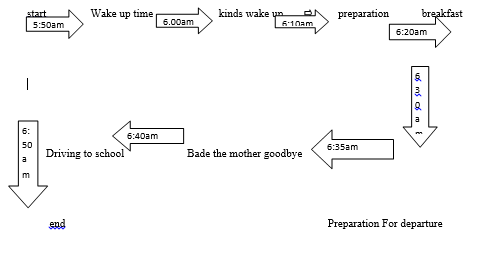Introduction
Being a very busy individual I need to do a lot of my duties with minimal time than ever before, one of the duties that I need to save on time is the taking of the children to school of which I do on regular basis just before driving to work. It has been a very tasking role to me and severally has made me to arrive at my place of work late. Due to this I have decided to undertake the process with the following flow to save on time and resources.

Handing over the kinds to the school heads.
After the taking of the kinds to the respective school and handing them over to their teachers I have the remaining ten minutes to make a follow up of the children’s school progress and then have the teacher to ask for the requirements that are fundamental for the well doing of the kinds.
Factors that affect the process design
The factors that need to be looked at as the contributory factors that affect the flowchart process are the demand nature and outline, the level and degree of the integrating, the flexibility, the degree of the automation, the levels of the quality and the degree of contact when one is making the process flow process decisions. Nature of demand and the outline flowchart processes need to be based on the user preferences and the needs of the same person. The procedures need to be scheduled to meet the demands and expectations of the person following the process to prevent the repetition of jobs and responsibilities yet we want o save on time (Gary & Lister, 1995). Demand outline needs to be estimatable through considerations of seasonarability. The total calling of the user to the flowchart while undertaking the processes need to be well considered because it’s a very prime factor for the efficiency of the undertaking. The Degree and the level of the vertical integration: The Vertical integration refers to the magnitude and the extent possibility of which the usage, follow up and the benefits and the effectiveness of the daily core flowchart and processes are brought to the ownership of the user. The level and the degree of the integration do determine the extent to which the process user and the benefits are produced. The degree of the Vertical integration does provide the flexibility in process which results in increased benefits and saving of time due to federal terms and design efforts. Flexibility: A flexible flowchart should be the one that is able to respond quickly to the changes in the user environment and the preferences and the utilization conditions Flowcharts need to be flexible for the sake of increasing the usage and follow up of the process with a lot of ease and attainment of the sought time saving. Degree of automation, this does reduce the related costs. The degree of automation needs to be realized for the processes undertaking to ensure that all the necessary steps and cores are followed smoothly. The quality and the level coupled by the degree of automation needs to be to the required extent for their to be the fluency in the follow up of the process.
According to Gary & Lister,(1995) the Metric that can be used to measure the effectiveness of the flowchart is the Balancing Results and Process Measures The use of the Results measures in general does reflect some of the indicators that would be of strategic in their nature. The results and the outcome measures would be the key predictors of the flowchart process performance and its usability in the future of the undertaking. The process measures are of the tactical nature and at most times do give a predictive element of the outcomes measures. The process measure is a significant influencer and contributor to the overall performance of the results measure.
Through tracking of the major and key processes making up the flowchart then one is able to gain a rightly understanding and the much more defined insight into what the immediate actions need to be taken to give out the results according to the expectations. Process metrics do directly impact on the products measure by tracking variables such as the efficiency and speed, for the processing of the actions and targets.One of the vital key operational process measure for a flowchart process does involve the process cycle time, which This is operationally the duration that is definable as the elapsed time which took to complete a serial of the routine. The maintenance of the balance between Process and Results does measure and avail the wider picture of the process hence allowing the right time to choose on the valuable improvement possibilities to acquire the require outcomes.
References
Gary, M.G. & Lister W.H. (1995). Essentials of Flowcharting. (5 ed.). New York, NY: McGraw- Hill.